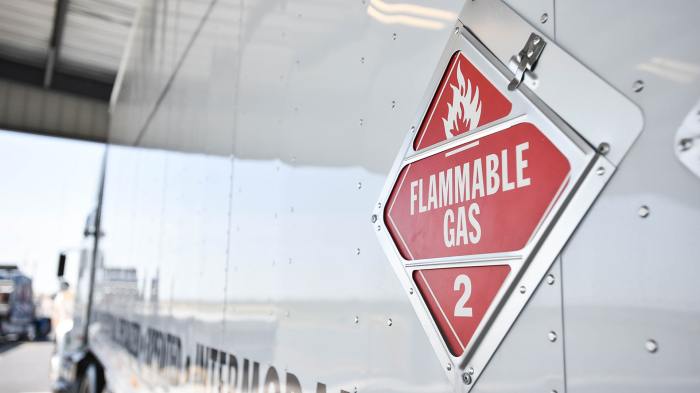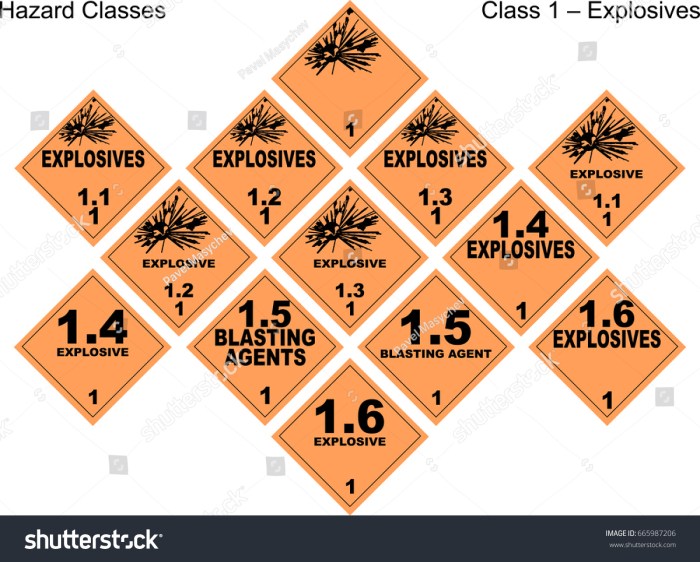Landstar does not transport which of the following hazard classes – Landstar’s commitment to safety and compliance extends to the transportation of hazardous materials, as evidenced by its strict policy of not transporting certain hazard classes. This article delves into the specific hazard classes excluded by Landstar, exploring the underlying safety concerns and regulatory framework that shape this policy.
Understanding Landstar’s restricted hazard classes is crucial for shippers, carriers, and receivers alike. It ensures the safe handling, transportation, and compliance with industry best practices and legal requirements.
Hazard Classes Not Transported by Landstar: Landstar Does Not Transport Which Of The Following Hazard Classes

Landstar is a leading provider of transportation and logistics services, but there are certain types of hazardous materials that the company does not transport due to safety concerns and regulatory restrictions.
Classes of Hazards Not Transported
- Class 1: Explosives
- Class 2: Gases
- Class 3: Flammable Liquids
- Class 4: Flammable Solids
- Class 5: Oxidizing Substances
- Class 6: Toxic Substances
- Class 7: Radioactive Materials
- Class 8: Corrosives
- Class 9: Miscellaneous Dangerous Goods
Reasons for Excluding Certain Hazard Classes
Landstar’s decision not to transport certain hazard classes is based on several factors, including:
- Safety concerns:Transporting hazardous materials can pose significant risks to human health and the environment. Landstar prioritizes safety and takes all necessary measures to minimize these risks.
- Potential liabilities:In the event of an accident or incident involving hazardous materials, Landstar could face substantial liabilities. By excluding these classes, the company reduces its exposure to such risks.
- Compliance with regulations:Landstar strictly adheres to all applicable regulations governing the transportation of hazardous materials, including those set forth by the Department of Transportation (DOT) and the Environmental Protection Agency (EPA).
Alternative Transportation Options, Landstar does not transport which of the following hazard classes
For customers who need to transport hazardous materials that Landstar does not handle, there are alternative transportation options available.
- Specialized carriers:There are companies that specialize in transporting hazardous materials. These carriers have the necessary equipment, training, and expertise to handle these classes safely and efficiently.
- Intermodal transportation:Intermodal transportation involves using multiple modes of transportation, such as truck, rail, and ship, to move hazardous materials. This can be a more cost-effective option than using a single mode of transportation.
When selecting an alternative carrier, it is important to consider factors such as the carrier’s safety record, experience in handling the specific hazard class, and insurance coverage.
Compliance and Regulations
The transportation of hazardous materials is governed by a complex set of laws and regulations. These regulations are designed to protect public safety and the environment.
The DOT and EPA are the primary agencies responsible for enforcing these regulations. They set forth specific requirements for the packaging, labeling, and transportation of hazardous materials.
Failure to comply with these regulations can result in significant penalties, including fines and imprisonment.
Communication and Coordination
Effective communication and coordination are essential for the safe transportation of hazardous materials.
Shippers, carriers, and receivers all play a role in ensuring that hazardous materials are handled and transported safely.
Best practices for communication and coordination include:
- Clear and accurate documentation
- Proper labeling of packages
- Emergency response plans
- Regular training for employees
Questions Often Asked
What are the hazard classes not transported by Landstar?
Landstar does not transport hazard classes 1 (Explosives), 2.3 (Toxic Gases), 6.2 (Infectious Substances), and 7 (Radioactive Materials).
Why does Landstar exclude certain hazard classes?
Landstar excludes these hazard classes due to the inherent risks and liabilities associated with their transportation, including potential harm to human health, the environment, and property.
What are the alternative transportation options for excluded hazard classes?
Specialized carriers with the necessary equipment and expertise are available to transport excluded hazard classes. Factors to consider when selecting an alternative carrier include their safety record, compliance with regulations, and insurance coverage.

